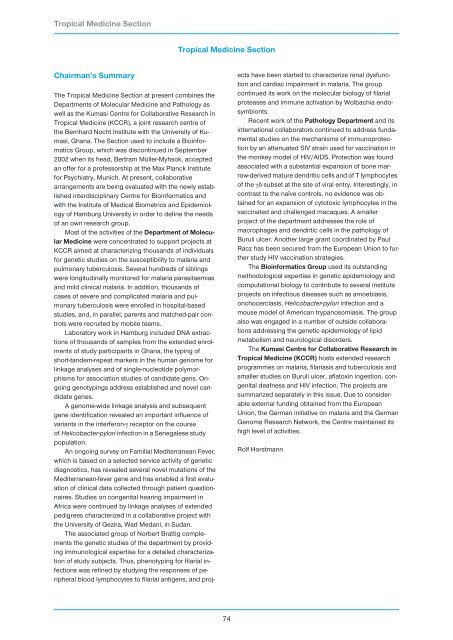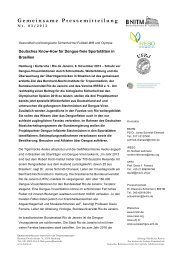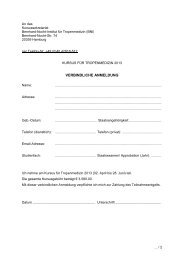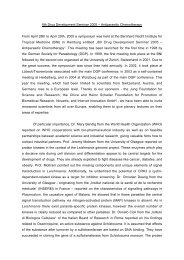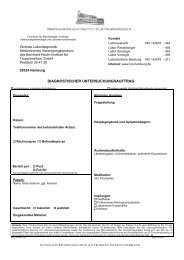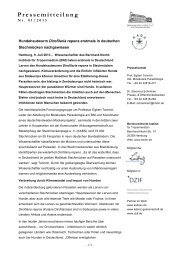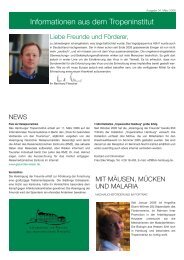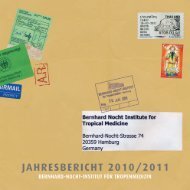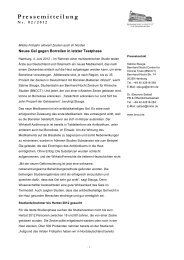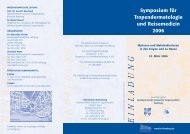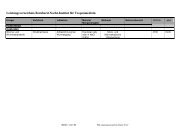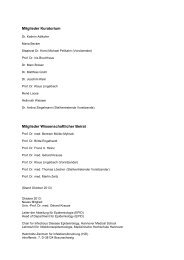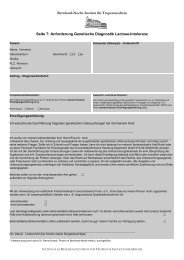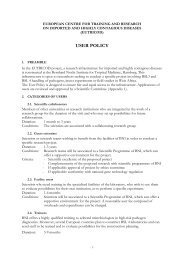Research Group Heussler (Malaria I) - Bernhard-Nocht-Institut für ...
Research Group Heussler (Malaria I) - Bernhard-Nocht-Institut für ...
Research Group Heussler (Malaria I) - Bernhard-Nocht-Institut für ...
Create successful ePaper yourself
Turn your PDF publications into a flip-book with our unique Google optimized e-Paper software.
Tropical Medicine Section<br />
Chairman’s Summary<br />
The Tropical Medicine Section at present combines the<br />
Departments of Molecular Medicine and Pathology as<br />
well as the Kumasi Centre for Collaborative <strong>Research</strong> in<br />
Tropical Medicine (KCCR), a joint research centre of<br />
the <strong>Bernhard</strong> <strong>Nocht</strong> <strong>Institut</strong>e with the University of Kumasi,<br />
Ghana. The Section used to include a Bioinformatics<br />
<strong>Group</strong>, which was discontinued in September<br />
2002 when its head, Bertram Müller-Myhsok, accepted<br />
an offer for a professorship at the Max Planck <strong>Institut</strong>e<br />
for Psychiatry, Munich. At present, collaborative<br />
arrangements are being evaluated with the newly established<br />
interdisciplinary Centre for Bioinformatics and<br />
with the <strong>Institut</strong>e of Medical Biometrics and Epidemiology<br />
of Hamburg University in order to define the needs<br />
of an own research group.<br />
Most of the activities of the Department of Molecular<br />
Medicine were concentrated to support projects at<br />
KCCR aimed at characterizing thousands of individuals<br />
for genetic studies on the susceptibility to malaria and<br />
pulmonary tuberculosis. Several hundreds of siblings<br />
were longitudinally monitored for malaria parasitaemias<br />
and mild clinical malaria. In addition, thousands of<br />
cases of severe and complicated malaria and pulmonary<br />
tuberculosis were enrolled in hospital-based<br />
studies, and, in parallel, parents and matched-pair controls<br />
were recruited by mobile teams.<br />
Laboratory work in Hamburg included DNA extractions<br />
of thousands of samples from the extended enrolments<br />
of study participants in Ghana, the typing of<br />
short-tandem-repeat markers in the human genome for<br />
linkage analyses and of single-nucleotide polymorphisms<br />
for association studies of candidate gens. Ongoing<br />
genotypings address established and novel candidate<br />
genes.<br />
A genome-wide linkage analysis and subsequent<br />
gene identification revealed an important influence of<br />
variants in the interferon-γ receptor on the course<br />
of Helicobacter-pylori infection in a Senegalese study<br />
population.<br />
An ongoing survey on Familial Mediterranean Fever,<br />
which is based on a selected service activity of genetic<br />
diagnostics, has revealed several novel mutations of the<br />
Mediterranean-fever gene and has enabled a first evaluation<br />
of clinical data collected through patient questionnaires.<br />
Studies on congenital hearing impairment in<br />
Africa were continued by linkage analyses of extended<br />
pedigrees characterized in a collaborative project with<br />
the University of Gezira, Wad Medani, in Sudan.<br />
The associated group of Norbert Brattig complements<br />
the genetic studies of the department by providing<br />
immunological expertise for a detailed characterization<br />
of study subjects. Thus, phenotyping for filarial infections<br />
was refined by studying the responses of peripheral<br />
blood lymphocytes to filarial antigens, and proj-<br />
Tropical Medicine Section<br />
74<br />
ects have been started to characterize renal dysfunction<br />
and cardiac impairment in malaria. The group<br />
continued its work on the molecular biology of filarial<br />
proteases and immune activation by Wolbachia endosymbionts.<br />
Recent work of the Pathology Department and its<br />
international collaborators continued to address fundamental<br />
studies on the mechanisms of immunoprotection<br />
by an attenuated SIV strain used for vaccination in<br />
the monkey model of HIV/AIDS. Protection was found<br />
associated with a substantial expansion of bone marrow-derived<br />
mature dendritic cells and of T lymphocytes<br />
of the γδ subset at the site of viral entry. Interestingly, in<br />
contrast to the naïve controls, no evidence was obtained<br />
for an expansion of cytotoxic lymphocytes in the<br />
vaccinated and challenged macaques. A smaller<br />
project of the department addresses the role of<br />
macrophages and dendritic cells in the pathology of<br />
Buruli ulcer. Another large grant coordinated by Paul<br />
Racz has been secured from the European Union to further<br />
study HIV vaccination strategies.<br />
The Bioinformatics <strong>Group</strong> used its outstanding<br />
methodological expertise in genetic epidemiology and<br />
computational biology to contribute to several institute<br />
projects on infectious diseases such as amoebiasis,<br />
onchocerciasis, Helicobacter-pylori infection and a<br />
mouse model of American trypanosomiasis. The group<br />
also was engaged in a number of outside collaborations<br />
addressing the genetic epidemiology of lipid<br />
metabolism and neurological disorders.<br />
The Kumasi Centre for Collaborative <strong>Research</strong> in<br />
Tropical Medicine (KCCR) hosts extended research<br />
programmes on malaria, filariasis and tuberculosis and<br />
smaller studies on Buruli ulcer, aflatoxin ingestion, congenital<br />
deafness and HIV infection. The projects are<br />
summarized separately in this issue. Due to considerable<br />
external funding obtained from the European<br />
Union, the German initiative on malaria and the German<br />
Genome <strong>Research</strong> Network, the Centre maintained its<br />
high level of activities.<br />
Rolf Horstmann


